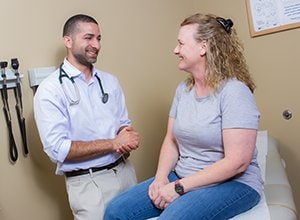Know your primary care options
 I love being a family medicine physician. I enjoy taking care of my patients and their families. With the changes in technology and health care today, CentraCare is trying to improve how we provide care to our patients. We want to make sure it is easy for patients to get the right care they need at the right time from the provider they want to see.
I love being a family medicine physician. I enjoy taking care of my patients and their families. With the changes in technology and health care today, CentraCare is trying to improve how we provide care to our patients. We want to make sure it is easy for patients to get the right care they need at the right time from the provider they want to see.
We live in a modern age where — if needed — you can get medical care in an emergency room, an urgent care center, a walk-in clinic, a clinic at a grocery store or even online.
But there’s no substitute for having a primary care provider to regularly review your health care needs.
Among the benefits of having a primary care provider include:
- Working with someone who is familiar with you and your health history can help more quickly determine what is the best care for you.
- Determine what immunizations you need, identify lifestyle changes that can prevent disease, recommend breast cancer screening and/or colon cancer screening.
- In general, having a regular primary care physician can help you manage chronic conditions — like hypertension or diabetes — which may help prevent complications, identify problems early and reduce your health costs.
- A primary care provider can help provide you with needed referrals, if you ever need to see a specialist.
- Seeing the same primary care provider regularly can help you feel at-ease, less stressed and leads to better communication.
So while the advantages are clear, the types of primary care providers may not be as easy. And knowing from the get-go the strengths of each type of provider can help you better identify who is the best fit for you and your family.
To help reduce any confusion, here’s a short list of common primary care options and other things you may see while making your decision.
- Pediatricians are familiar with the health needs of children.
- Internists — physicians who work in Internal Medicine — specialize in the health needs of adults.
- Family medicine providers — can see children and adults. Some providers within family medicine may also be able to provide prenatal care to women during pregnancy and deliver the baby when that time comes.
- Nurse practitioners play a vital role caring for patients throughout any health organization — including primary care. Nurse practitioners are available to provide care within pediatrics, internal medicine, family medicine and women’s health clinics.
- Physician assistants are licensed health care providers who, like physicians and nurse practitioners, can examine and diagnose patients, develop treatment plans and write prescriptions. Physician assistants always work in conjunction with a physician.
CentraCare Connect has information on who is currently taking new patients and can schedule you with a primary care provider. To contact CentraCare Connect, you can chat online, text or call 320-200-3200. You also can review online the CentraCare providers who currently are accepting new patients.
The Initials Game
Ever wondered what all of the initials after a medical professional’s name mean? There are many different titles and after awhile it may feel like alphabet soup to you. In case you were curious, here’s a list of some of the most common ones you will see and their meaning.
MD – Doctor of Medicine
DO – Doctor of Osteopathic Medicine. Osteopathic medical schools — there are about 30 in the U.S. — have a slightly different training and unique approach to patient care. Osteopaths are licensed physicians and found in all subspecialties of medicine.
MBBS – Bachelor of Medicine, Bachelor of Surgery. This is a degree obtained by physicians who have graduated from medical schools following the traditions of the United Kingdom in countries such as the United Kingdom, Australia, Ireland and India. In the U.K. tradition, physicians who have completed medical school get the MBBS degrees.
CNP – Certified Nurse Practitioner. This title is given to a registered nurse who has done additional education and training to diagnose and treat patient health concerns. Most CNPs are also APRNs — which stands for Advanced Practice Registered Nurse — and denotes those who have also done additional study and work within the field of nursing.
PA – Physician Assistant. See the summary to learn about a PAs play a role in examining and diagnosing patients.
To learn more, please review our Definitions of Health Care Provider Credentials page.